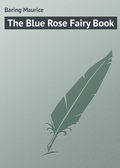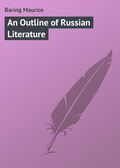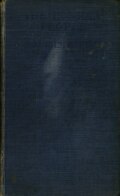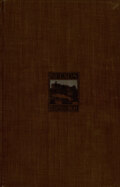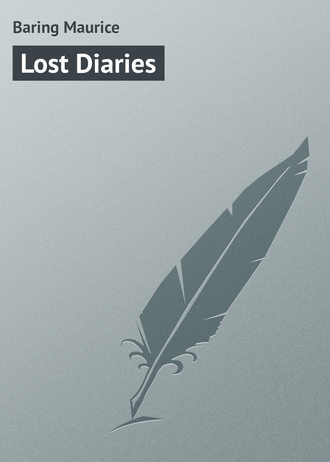
Maurice Baring
Lost Diaries
X
FROM THE DIARY OF HARRIET SHELLEY
George Street, Edinburgh, September 6, 1811. – Mr Hogg arrived this morning. He seemed at first to be quite oblivious of the fact that he was in the city of the unfortunate Queen Mary. Bysshe and I conducted him to the palace of Holyrood immediately, where we inspected the instructive and elegant series of portraits of the Scottish kings. I was much affected by the sight of the unfortunate Queen's bedroom.
Mr Hogg has not been well grounded in history; and he was on more than one occasion inaccurate. He had never heard of Fergus the Just. Bysshe was much moved, and enchanted by the objects of interest. He ran through the rooms at a great pace, now and then pointing back at an object of interest and exclaiming: "That is good." I regretted the absence of Eliza, but perhaps it is as well that she was not with us on this occasion. She would not have permitted me to contemplate the tragic stain of Rizzio's wound, for fear of the effect the sight might have on my nerves. Mr Hogg was strangely insensible to the sorrowful associations of the spot.
After we had inspected the rooms and the relics, Bysshe with intent, I, with renewed awe, and Mr Hogg with a somewhat inopportune levity, Bysshe was obliged to go home and write letters, and so I suggested that Mr Hogg should conduct me to Arthur's Seat, in order to enjoy the sublime prospect which that eminence commands.
So sublime, so grand, so inspiring was the view that even Mr Hogg was impressed. As for myself, words fail to express the manifold and conflicting emotions which were stirred in my breast. The weather was fine, clear and tranquil; but alas! no sooner had we started on our descent than the wind began to blow with great violence. It was of course impossible for me in such circumstances to risk the impropriety which might be occasioned, had the wind, as was only too probable, so disturbed my dress as to reveal to my companion the indelicate spectacle of my decently concealed ankles, so I seated myself on a rock resolving to wait until the violence of the wind should subside. Mr Hogg, who laid unnecessary stress on the fact that he had not dined on either of the preceding days, and being deficient in a proper sense of delicacy and seemliness, vowed he would desert me and proceed home by himself. To my dismay he began to carry his threat into execution, and it was with the utmost difficulty that I succeeded in accomplishing the descent without affording him any unseemly exhibition.
Sunday. – The manner in which the Sabbath is observed in this city is repellent to my principles. Bysshe and Mr Hogg have gone to the Kirk. I pleaded the wearisome performance would be certain in my case to bring on a headache and so I remained at home. They returned much exhausted by the wrestlings of an eminent divine with Satan. I am engaged in translating Madame Cottin's immortal "Claire D'Albe" into English prose. This occupies my morning. Bysshe is translating a treatise of Buffon, with which we were both of us charmed. In the evenings I read out "Telemachus."
I regret to say that Bysshe fell asleep while I was but half way through an instructive discourse of Idomeneius relating to the wise laws of Crete. Mr Hogg is an attentive listener and it is a pleasure to read to him.
York, October 10, 1811. – Travelled by post-chaise from Darlington. Read "Anna St Ives" by Holcroft in the chaise throughout the journey. Bysshe was restless and suggested my skipping certain portions of the narrative. I, of course, declined, knowing that it was the intention of the authoress that her work should be read without omissions. Bysshe is obliged to go to London. In the evenings I read out Dr Robertson's historical works to Mr Hogg. We are on the eve of a great event. My dear sister Eliza has consented to visit us and is about to arrive. What a privilege for Mr Hogg, what a source of pleasure for Bysshe. I ardently regret that he should not be present to welcome her.
October 25. – Eliza has arrived. I am deeply touched by her kindness in coming and overcome when I think what a joyful surprise her presence will be for Bysshe, and how it will illuminate our household.
October 26. – Bysshe arrived from London. Eliza spent the day brushing her hair. In the evening I suggested reading aloud from Holcroft; but Eliza, such is her kind-heartedness, feared that it might upset my nerves. She felt certain too, that her esteemed friend, Miss Warne, whom she regards as a pattern and model in all things, would not approve of Holcroft.
October 26. – Eliza is certain that Miss Warne would find nothing to admire in York Minster. Changed our lodgings. Eliza thinks that the pure mountain air of the Lakes would be salutary to my nerves. Bysshe and Mr Hogg miss our evening readings. I sometimes, however, continue to read to them in an undertone when Eliza is brushing her hair. But the pleasure is marred by the trepidation I am in lest I should disturb her. Eliza objects to the name Bysshe. She is certain Miss Warne could not endure such a name, so in future my husband shall be called Percy. It is certainly prettier and more romantic.
Keswick, November 16. – We have made the acquaintance of the Southeys. Mr Southey is a great reader and devotes two hours daily to the study of the Portuguese and Spanish languages. Mrs Southey is an adept at book-binding and binds her husband's books with elegance and neatness. Bysshe, I mean Percy, has alas three times narrowly risked offending the poet. The first time by inadvertently taking a book down from one of his book-shelves, the second time by falling asleep when Mr Southey after having locked him into his study was reading aloud to him his epic, "The Curse of Kehama," and the third time by sharply criticising his action in eating tea-cakes, and by subsequently devouring a whole plate of them, himself.
Bysshe, I mean Percy, has implored me to beg Mrs Southey to instruct me in the art of making tea-cakes. I wish Eliza could begin to realise the existence of Bysshe, I mean Percy. She seems altogether unaware of his presence in the house; but then Eliza is so much occupied in considering what will be best for me that she has no time to bestow any attention to anything else. Percy is contemplating the composition of a poem which is to be called "Queen Mab." Eliza said that Miss Warne had a horror of "Queen Mab"; Bysshe explained to her that his poem was to be didactic and philosophical and had nothing to do with fairies. "That," said Eliza, "makes it worse." Bysshe ran out of the room with shrill exclamation of impatience. "Hush, hush!" said Eliza, "think of poor Harriet's nerves."
November 20. – Bysshe confessed to me that he could see neither beauty nor charm in Eliza. This is curious since her black hair has always been an object of universal admiration. I am afraid that Eliza does not understand him. I need hardly say what a disappointment this is to me.
Bysshe and I were thinking of writing a novel in collaboration. But Eliza said that Miss Warne considered that it was not seemly for a woman to dabble in fiction. Bysshe, I mean Percy – (In writing I find it difficult to accustom myself to the new name, but I am fortunately successful in the presence of Eliza in always saying Percy) – Percy and I are thinking of studying Hebrew. I have not yet told Eliza of this project. She is opposed to my reading Latin authors in their original tongue.
November 30. – We were walking this afternoon in the neighbourhood of the lake. Percy, Eliza and myself. Percy was talking of Plato's republic when Eliza interrupted him by recalling to his mind something which she had indeed often mentioned before, namely, Miss Warne's positive dislike of all the Greek authors and especially Plato. Scarcely had she uttered these words, when we looked round and found that Bysshe had vanished in silence like a ghost in the trees. We called and searched for him in vain.
But when we returned to the house we found him awaiting us buried in a book.
The incident greatly displeased Eliza and she insisted upon my taking to my bed as soon as we got home, although I confess I felt no suspicion of any ailment, nor would she hear of my reading either aloud or to myself. She sat by my bed-side, brushing her hair. She grieved me by saying that she could not conceive what Miss Warne would think of Bysshe. I mean Percy.
XI
FROM THE "JOURNAL INTIME" OF THE EMPEROR TIBERIUS
February 1. – Disquieting news from Parthia. Artabanus is giving trouble again. Shall probably have to send an expedition. The military party in Rome say that there will probably be unrest in Thrace in the spring. I remember they said the same thing last year. Slept wretchedly last night. Claricles' medicine is worse than useless. Wrote three despatches and one private letter. Fed Hannibal, the tortoise. Went for a stroll in the afternoon. Picked the first wind-flower, and put it in water. The gardener says we shall have some rain shortly. Please the Gods this may be true, as the country needs it badly! Dined alone. Played spilikins after dinner with Fufius, but found it a strain.
February 2. – Woke at four and remained awake until seven, then went asleep again, and overslept myself. Scolded Balbus for not calling me. He said he did not dare call me more emphatically. Told him it must not occur again.
February 3. – Nothing particular.
February 4. – Letter from my mother begging me to come and see her. Says she is suffering from lung trouble. Women are so unreasonable. She must realise that it is impossible for me to get away just at present. Hannibal would not touch his lettuce to-day. This is the third day running it has happened. Claricles has given him some medicine. Strolled along to cliffs in the morning. Much vexed by a fisherman who pushed a lobster under my very nose. I have a horror of shellfish. Varus and Aufidius dined. Found their conversation a strain. So retired early. Read the Seventh Book of the "Æneid," but found it insipid. Virgil will certainly not live. He was a sycophant.
February 10. – Anniversary of poor Julia's death. Began to write short poem on the subject, but was interrupted by the arrival of the courier from Rome. Much vexed, as it altogether interrupted my train of thought and spoilt what would have been a fine elegy. News from Rome unsatisfactory. It rained in the afternoon, so I did not go out. Sorted my specimens of dried herbs, which are in a sad state of confusion. Dined alone. Dictated a despatch to Sejanus. Read some of the "Alcestis" (Euripides) before going to bed. Alcestis reminds me of Julia in many ways. She had the same fervid altruism and the same knack of saying really disagreeable things. But they both meant well…
March 1. – A lovely spring day. Went for a stroll, and jotted down a few ideas for a poem on Spring. The birds were singing. Listened for some time to the babbling of the brook. Think of alluding to this in the poem. "Desilientis aquae" would make a good ending to a pentameter. Mentioned it to Fufius when I came in, casually. He said he did not think it was very original. Fufius is hyper-critical. He does not feel poetry. Finished the memorial lines on Julia ending "Ave atque Vale." Shall not show them to Fufius. He would be certain to say something disparaging. Positively haunted by the sight of the wild tulips in the hills, fluttering in the breeze. Sights like this live in the memory. Disturbed early in the morning by a noise of hammering. It is strange that where-ever I go this happens. Made inquiries, and ascertained that the stable roof is being repaired. If it is not the stable roof it is sure to be something else. Last week it was a strayed cow which woke me at five. Find it very difficult to get sleep in the early morning, whatever precautions I take. In a month's time the nightingales will begin, and then sleep will be out of the question. Thinking of writing a poem called "To Sleep."
March 10. – Claricles says I am overworked and need a change. Have decided to go for a short walking tour, quite by myself. Thought of taking Fufius, but knowing how self-willed he is, decided not to. Packed my knapsack. Took an extra pair of sandals, a worsted scarf, an ivory comb, two gold toothpicks, and a volume of Sappho's Songs. Find this light, feminine verse suitable for outdoor life. Shall start early to-morrow. Had my hair cut. The slave was clumsy when cutting round the ears. They still smart. Find this fault to be universal among haircutters. Shall take tablets with me in order to jot down any ideas for future poems, although Claricles advises me to give up writing for two or three weeks.
March 13. – Returned earlier than I expected. Walking tour successful on the whole. Visited Sorrentum, an idyllic spot. Not sure I don't prefer it to Capreæ. It is a curious thing that man is always discontented with what he has, and hankers after what he has not got. Walked leisurely the first day, stopping every now and then for light refreshment. Found the country people very civil and anxious to please. Nobody knew who I was, and I was intensely gratified by many spontaneous and frank experiences of loyalty and devotion to the Emperor. This is refreshing in this sceptical age. It is a comfort to think that although I may not go down to posterity as a great military genius like Julius Cæsar, I shall at least leave a blameless name, as far as my domestic life is concerned, and an untarnished reputation for benevolence, kindness, and unswerving devotion to duty. Without being conceited, I think that some of my verse will live. I think I shall be among the Roman poets when I die; but this is not saying much, when one considers the absurd praise given to poetasters such as Virgil and Ponticus. Strolling along the seashore near Sorrentum a very pretty little episode occurred. A woman, one of the fishermen's wives, was sitting by her cottage door, spinning. Her child, a little girl about six years old, was playing with a doll hard by.
I said "Good day" to the fisherman's wife, and she offered me a glass of wine. I declined, as Claricles has forbidden me red wine, but I said I would gladly accept a bowl of milk. She immediately went to fetch it, and the child went with her. When they returned the child offered me the bowl, lisping in a charming manner. I drank the milk, and the mother then said to the child:
"Tell the kind gentleman whom you love best in the world."
"Papa and mamma," lisped the child.
"And after that?" asked the mother.
"After that the divine Emperor Tiberius, who is the father and the mother of us all," she said.
I gave the mother a gold piece. Fufius says it is a mistake to give money to the poor, and that it pauperises them. He says one does more harm than good by indiscriminate charity. But I think it cannot be a bad thing to follow the impulses of the heart. I should like this to be said of me: "Although he had many faults, such as discontent and want of boldness, his heart was in the right place." It is little incidents like the one I noted above which make up for the many disappointments and trials of a monarch's life. The second day of my tour was marred by a thunder-shower, but I found a thrush's nest and three eggs in it. There are few things which move me so inexpressibly as the sight of a thrush's nest with the eggs lying in it. It is curious that the nightingale's egg should be so ugly. Owing to the bad weather, and the rheumatism in my joints which it brought on, I was obliged to cut short my tour.
(This extract probably belongs to a later period)
June. – Asinius Gallus has again sent in a petition about the prison fare. It appears he has a conscientious objection to eating veal. The officials say they can do nothing. If they make an exception in his favour they will be obliged to do so in many less deserving cases. I confess these little things worry me. Our prison system seems to me lacking in elasticity; but it is dreadfully difficult to bring into effect any sweeping reform; because if the prison disciplinary system is modified to meet the requirements of the more cultivated prisoners, the prisons would be crowded with ruffians who would get themselves arrested on purpose. At least this is the official view, and it is shared by Sejanus, who has gone into the matter thoroughly. I confess it leaves me unconvinced. I am glad to say we are ahead of the Persians in the matter. In Persia they think nothing of shutting up a prisoner – of whatever rank – in a cell and keeping him isolated from the world sometimes for as long as three months at a time. This seems to me barbarous.
July 6. – The heat is overpowering. Agrippina threatens to come home and to bring her daughter. I wrote saying I thought it is very unwise to bring children here at this time of year, owing to the prevalence of fever. She answered that her daughter was looking forward to the sea-bathing. If they come it will mean that my summer will be ruined.
July 7. – I went to the home farm this afternoon. The farmer's wife is very ill. There is little or no hope of her recovery. Spent two hours there reading out passages of the "Odyssey." She does not understand Greek; but it seemed to soothe her. Her husband told her that he felt confident that she could not get worse after this. The faith of these simple folk is most touching. How unlike Fufius and all his friends.
August 1. – There is no news except that, as always occurs at this time of year, the Phœnix is reported to have been seen in Egypt.
August 3. – One of those distressing little incidents happened to-day which entirely spoil one's comfort and peace of mind for the moment: just like a piece of dust getting into one's eye. My old friend Lucius Anuseius came all the way from Rhodes to see me. By some mistake he was shown into the Chamber, where prisoners are examined, and before the error was rectified he was rather rudely interrogated. It turned out afterwards that Balbus mistook him for Titus Anuseius, the informer. Balbus is growing more and more stupid; he forgets everything. I ought to send him away; on the other hand, he knows my habits, and I should feel lost without him. As it is, Claricles says that Lucius is likely to feel it for several days. He is so sensitive and the slightest thing upsets his nerves. All his family are touchy, and I am afraid he will look upon the matter as a deliberate slight. If it had happened to anyone else it would not have mattered. They would have understood at once. This has quite put me out. But, as Fufius says, how little I shall think of this in a year's time.
August 7. – Lucius Anuseius left the island in a huff. It is most regrettable.
August 12. – Agrippina arrives to-morrow. There is nothing to be done. How pleasant life would be were it not for one's relations.
XII
FROM THE DIARY OF ŒDIPUS REX
Corinth. The Feast of the Minotaur.– My birthday and coming-of-age. All went oft very successfully. Papa gave me a chariot and mamma a pocket tooth-pick, set in gold, with an Egyptian inscription on it (two flamingoes and a water-rat, which means in Egyptian "Be merry and wise"). Nausicaa, my nurse, gave me a stylus-wiper with "A Present from Corinth" beautifully worked into it in silk. Polyphemus, our faithful old messenger (who has only one eye), gave me a pair of sandal strings. Very useful, as I'm always losing mine.
In the morning, after I had received all the family congratulations and tokens, at the first meal, there was a public presentation of gifts in the palace.
The town of Corinth sent a deputation, headed by the Priest of the Temple of Castor and Pollux, which presented me, on behalf of the city, with a silver vase, symbolic of the freedom of the city, beautifully embossed, and engraved with a suitable inscription.
The priest made a long speech, and papa, who never cared for oratory, kept on muttering, "By Demeter, be brief," but the priest wasn't brief. He spoke for nearly an hour.
Then I had to respond. I said I would earnestly endeavour to follow in my father's footsteps and to deserve the good-will and esteem of my future subjects, which was being manifested in so touching and patriotic a fashion. My speech had all been written out for me beforehand by Zoroaster, my Persian tutor; but I flatter myself I added a few unexpected and telling touches.
For instance, I began by saying: "Unaccustomed as I am to speaking in public – ." They cheered this to the echo.
I also managed to bring in rather an amusing anecdote about how a foreign merchant called Abraham tried to get the better of a Corinthian merchant in a bargain, and how the Corinthian got the best of him by guile. This provoked loud laughter.
My peroration, ending with the words:
"What do they know of Corinth who only Corinth know?"
(a quotation from Tyrtæus) was loudly cheered. But my cousin Thersites almost spoilt the effect by adding audibly, "Quite enough."
In the afternoon there were games, and an ox was roasted whole for the ὁι πολλὸι. Papa says, now I am of age, I must go and pay my respects to the oracle at Delphi. It is a family tradition.
Delphi. – (What is the date?) – Arrived at last after a tedious journey. The inn is very uncomfortable. This is too bad, as in the guide book (Odysseus') it is marked with a constellation of the Pleiades, which means very good. The wine tastes of tar. And the salt is a chemical compound called Σερεβος. I made a scene and asked for ordinary slaves' salt, and they hadn't got any.
Shall not stay at this inn again, and I shall warn others not to. It is called ΞΕΝΩΛΟΧΕΙΟΝ ΒΑΓΟΝΛΗ. Disappointed in the Temple (very late architecture) and still more in the Oracle. I suppose it thought I didn't pay enough. But because one happens to be a prince, I don't see why one should be robbed. Besides which. I am travelling incognito as Kyrios Ralli. But the priests bowed, and they all called me, "your Shiningness." The Oracle was quite absurd, and evidently in a very bad temper. It said I would kill my father and marry my mother. It only shows how absurd the whole thing is. I hate superstition, and oracles ought to be stopped by law. Gypsies on the roadside are put in gaol. Why should oracles be supported by the State? I shall write to the False Witness about it.
In the afternoon went to the theatre. Saw the tragedy of Adam and Eve, a historical drama, translated from the Hebrew. Very long. The part of the Archangel, danced by Thepsis, was very bad, and the man who danced Eve was too old; but the snake was good. Scenery fine, especially the tree (which had real leaves).
Daulis, Tuesday. – Arrived this morning. Very disappointing; the famous Daulian nightingale is not singing this spring. Just my luck. Rather an amazing incident happened yesterday on the way. My chariot was run into by a stranger. He was on the wrong side of the road, and, of course, entirely in the wrong. Also, his charioteer was not sober. We shouted, and we gave them ample room, and time, but he ran straight into us and his chariot was upset. The owner and charioteer were both taken to the Æsculapian Home, which is under the management of the Red Serpent. The doctor said it was serious. We did all we could, but had to go on, as I was due at Daulis to-day.
Thebes, a year later. – Staying with Queen Jocasta, a charming widow. All very comfortable. Everybody is concerned about the Sphinx, who is really causing great annoyance, asking impertinent riddles, and playing dangerous practical jokes on people who can't answer. They want me to go. Very tiresome, as I never could answer a riddle; but it's difficult to refuse.
Wednesday. – Saw the Sphinx. Guessed the riddle first shot. It asked what was that which runs on two legs, has feathers and a beak, and barks like a dog. I said "pheasant," and I added, "You put that in about the barking to make it more difficult." The Sphinx was very angry and went off in a huff, for good.
Thursday. – As a reward for getting rid of the Sphinx I am allowed to marry the Queen; we are engaged. Everybody thinks it an excellent thing. She is a little older than I am; but I don't think that matters.
(Ten years later)
Thebes. – Rather a severe epidemic of plague. They say it is not bubonic, however. In fact, it is what they call plagueen. Still, there are a great many deaths.
Thebes, a week later. – The plague increasing. Have sent for Tiresias to find out what it comes from.
Tuesday. – Tiresias arrived. Very cross and guarded. Don't believe he knows anything about it. Doesn't want to commit himself. He loves making mysteries.
Saturday. – Insisted on Tiresias speaking out. Regret having done so now. He flew into a passion, and threatened the whole court with "exposure" and "revelations." That's the last thing we want now.
Monday. – Had it all out with Tiresias. He told the most absurd cock and bull story. Utterly preposterous, but very disagreeable even to have such things hinted. Said nothing to Jocasta, as yet. Luckily, there are no proofs. Tiresias has raked up an old shepherd, who is ready to swear I am not the son of the King of Corinth, but the son of Laius, King of Thebes, and of Jocasta (my wife!); and that Laius was the man I accidentally killed years ago on the road to Daulis!
Tiresias says this is the sole cause of the plague, which is getting worse. They now say it is Asiatic.
Thursday. – I interviewed and cross-examined the shepherd in the presence of Tiresias. There seems to be no doubt whatsoever about the facts. But I cannot see that any good can be done now, after all these years, by making a public scandal. It is, after all, a family matter. Tiresias says the plague will not stop unless the whole truth is published. Very awkward. Don't know how to break it to Jocasta.
Friday (dictated). – Jocasta overheard me discussing the matter with Tiresias and jumped, rashly, to conclusions. She had hysterics, and, losing all self-control, seriously injured both my eyes with a pin. I may very likely be blind for life. She was very sorry afterwards, and is now laid up. I and the children leave for Colonnus to-morrow, and it is settled that I am to abdicate in favour of Creon on the plea of ill-health and overwork. The children have been told nothing; but Antigone, who is far too precocious, alluded to Jocasta as grand-mamma. The matter will be hushed up as far as possible.
Citium Colonnus, two months later. – The air here is delicious. Must say the change is doing me good.



